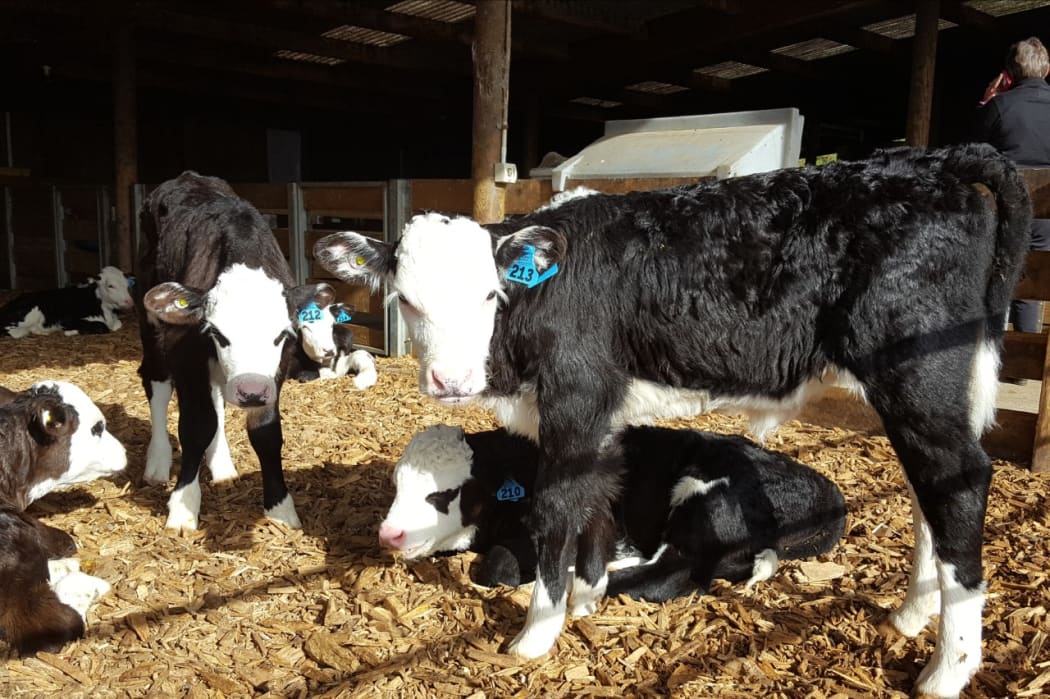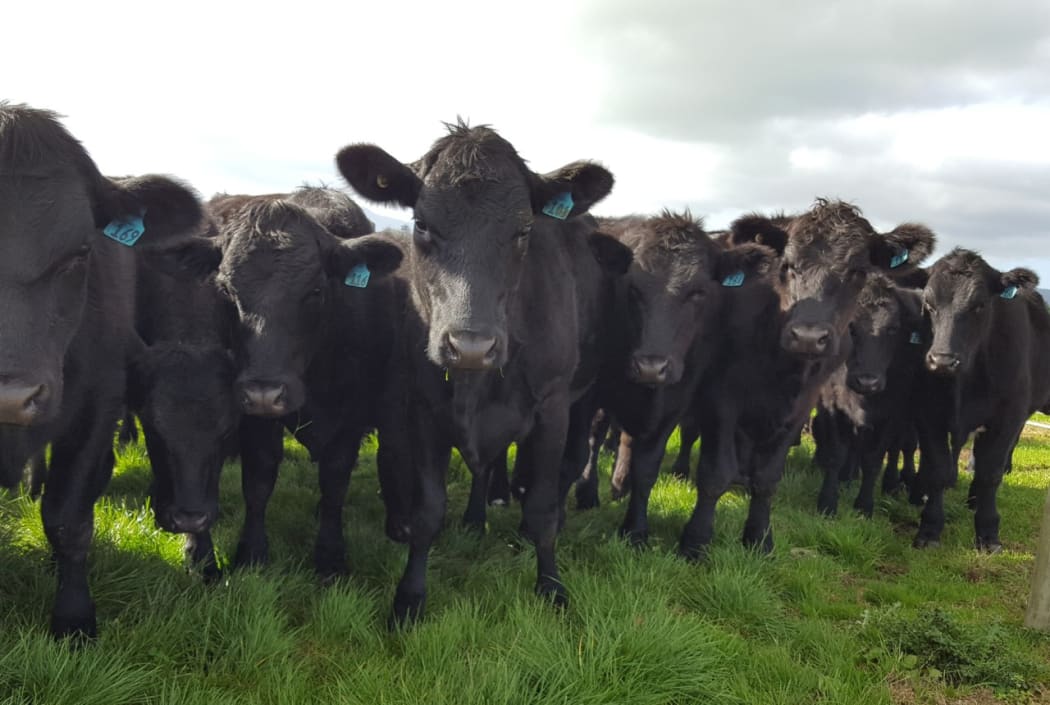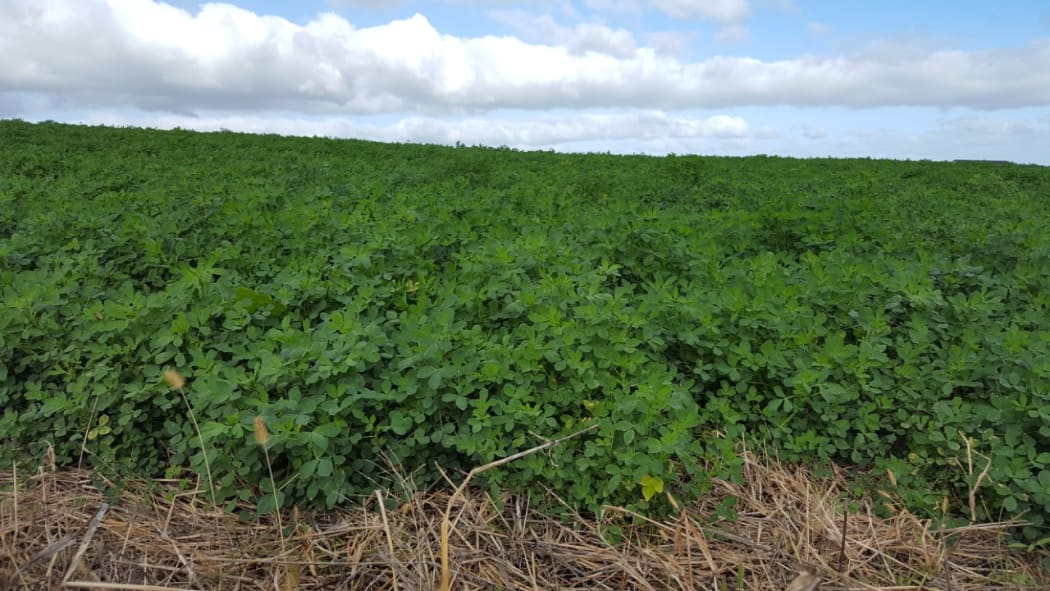
Photo: RNZ/Susan Murray
Looking at conditions on the land now and there's not much feed ahead of any class of stock in Northland. Apparently the Far North has had its second lowest rainfall on record, for the year to date .. and records began in 1938. Kaitaia and south is a little better off. The lack of kikuyu growth has been an issue, but that short term pain will be a longer term gain in that clover and other grass growth will be better in late winter and early spring.
There was no rain in South Auckland apart from rogue light showers in some places. Otherwise
it's been overcast and gloomy with mild days and light winds. Brassicas, and lettuce plants are still going in the ground and more onions have been sown.
Waikato looks a whole lot better than a month ago when things were a mess... pasture covers have increased significantly so most farmers will hit target covers and cow condition for June. Farmers have made a big effort with supplementary feeding according to the farm consultant we talked to. Some dairy farmers who winter graze stock on sheep and beef farms are being caught out .. dry stock farms are short of feed so not entering grazing contracts, or are taking fewer animals than normal. This week's payout announcement was close to expectations for next season, but they were certainly hoping for more this season that's ending.
In Bay of Plenty the kiwifruit harvest is progressing well in beautiful clear days. The warmth has meant the fruit's not maturing as fast as the packhouses would like. They want fruit with high sugar levels because it means they can store it for longer. Lots of workers are doing 70 hour weeks to get through the work.
Taranaki had thick fogs in the morning this week... but it's warm and grass is still growing well. Most herds are dried off.
There's very little grass in central King Country... luckily frosts haven't hit yet. Farmers are desperately trying to get cattle into the works to get the extra mouths off the farm but there's a back log to get stock killed.
The East Coast is continuing to have beautiful weather. There are still a few paddocks of maize to be harvested. Surging seas are holding up logging boats .. half a dozen have been sitting at sea this week waiting for things to calm down bfore they come into the wharf for loading. The manadrin harvest is starting to really crank up .. it's nice an dry underfoot on orchards.
Hawkes Bay apple orchardists were thankful to get through the harvest with great weather ... they were short of labour and any days lost with rain would've caused real headaches. Asian countries are "very receptive" to our apples this year, and paying good money. China had a big frost last spring and because it grows half of the world's apple supply, losing about 20% of their production has had a huge impact. Back home there have now been some frosts which means trees are quickly becoming dormant and winter chill calcuations can start .. winter chill impacts on spring flowering results.

Photo: RNZ/Susan Murray
Conditions on Wairarapa dairy farms are more like early autumn than late autumn. .. it's dry under foot and there's enough grass around. Herds are being dried off now.
Pasture covers are definitely lower than normal around Taihape. There was a green drought in autumn with very little rain and then any follow up came too late to do much. Dams are low. Ewes have come through mating well but a number of hoggets have struggled or died with pneumonia. On the whole however farmers are in good head space as winter approaches.
It was cold and rainy in Horowhenua this week but on dairy farms the grass is still growing more quickly than the cows are eating it.
Apple packing continues in cool stores in the Nelson/Motueka region. Pruning's underway on Royal Gala's and other early varieties. Some people are tree training in younger orchards and pulling out blocks that haven't performed well. Kiwifruit picking's done and dusted apart from a few blocks of green haywards. Over all, this season's apples and kiwifruit are sweet with great flavour due in part to the hot, dry summer.
Eastern Marlborough's dry and warm. A farmer a Seddon says its hard yakka doing the fencing as the grounds like rock. There's plenty of feed around for the dairy grazers that are being trucked in for winter and beef bulls have moved onto barley crops. Now that the leaves are dropping in vineyards, pruning's full steam ahead in sauvignon blanc and pinot noir blocks and sheep have moved in to clean up between the rows.
A number of dairy farms on the West Coast have dried off. Our contact near Lake Brunner says he's still going but has already dried off any cows who were tired of being milked. The Westland Milk factory closes its doors on June 10th. A few guys are putting urea onto paddocks as apparently it works as an antifreeze and stock are getting a top up of supplementary feed.
It's been another great week in Canterbury with mild temperatures, the odd light frost and the grass is still growing. Dairy farmers are finding it odd drying off in these conditions however winter will come at some stage. Over the next couple of weeks a large volume of cows will be moved to winter grazing blocks.
Conditions in South Otago this week have been near on perfect for drying off cows with sunny days and little rain. Some herds have gone to winter run offs while others are transitioning onto fodder beet. A farmer at Balclutha says it's been an average season milk production wise, but he says it's been a mixed bag for other dairy farmers in the region; with some are down on last year's results and others way up.
A farmer at Waimahaka in Southland says she dried off on Wednesday and the cows have moved onto the winter feed regime until milking begins again in August. Contract dairy farm staff are finishing up and moving to other jobs. On sheep farms the rams still out and stock are behind hotwires on grass and swedes.

Photo: RNZ/Susan Murray

